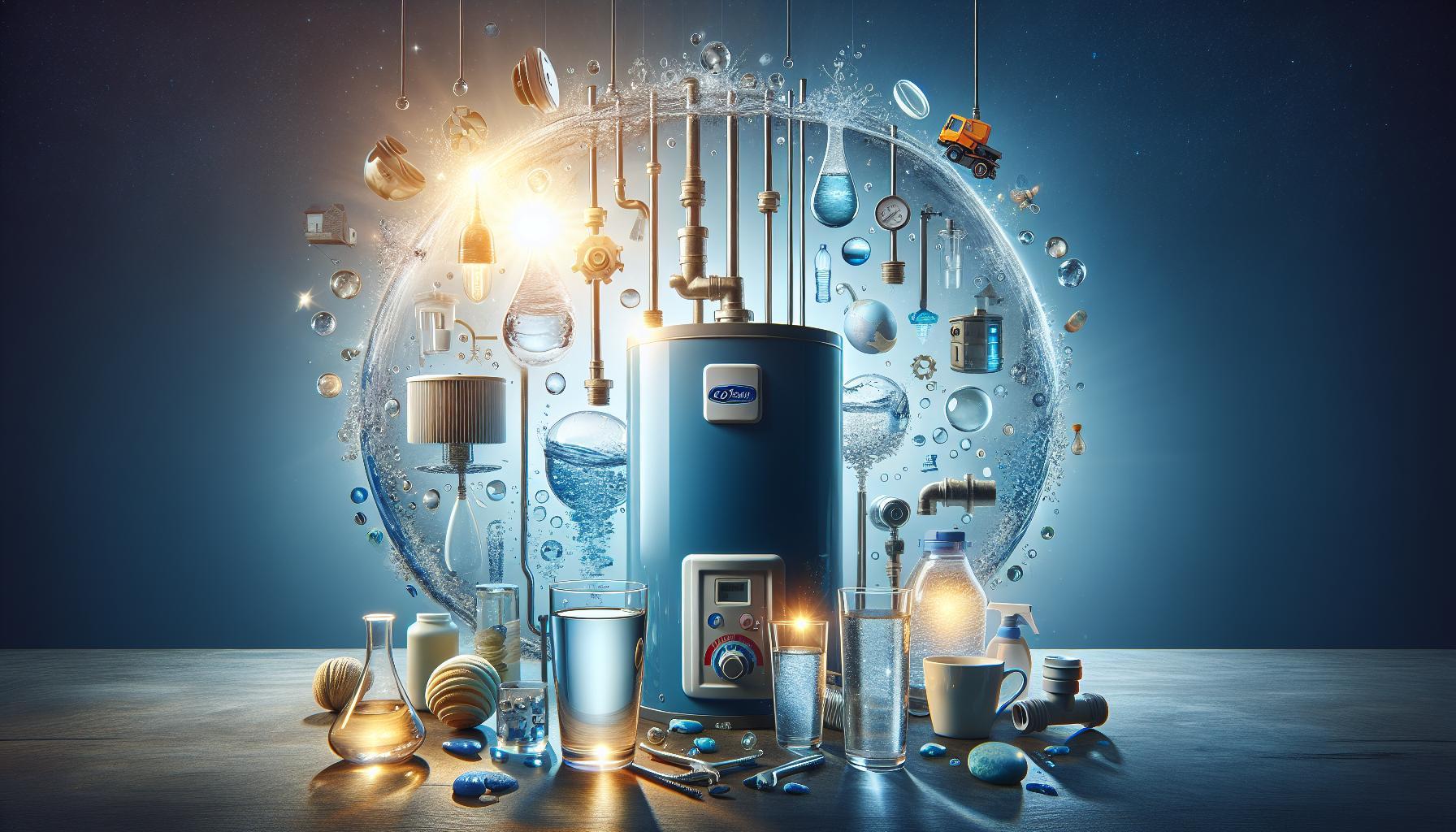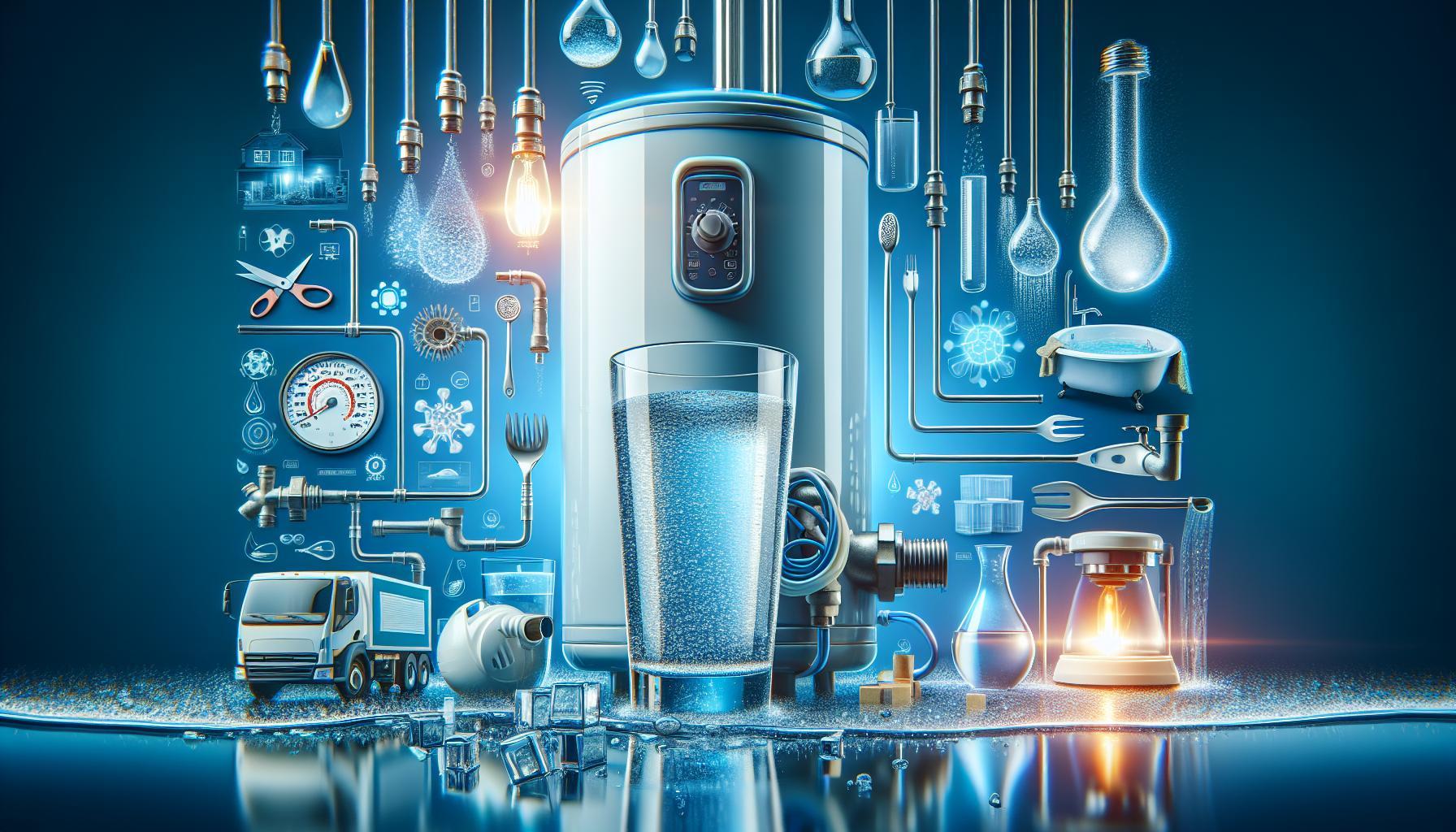Upgrading your home’s water heater can be a game-changer, not just for daily comfort but also for your property’s value. A modern, efficient system appeals to buyers, potentially increasing your home’s worth and marketability. Understanding the financial implications of this investment is crucial for homeowners looking to enhance their property’s overall appeal.
Understanding the Impact of Home Improvements on Property Value
Investing in home improvements can be a strategic move for homeowners looking to increase the value of their property. One significant aspect that often gets overlooked is how specific upgrades, like replacing a water heater, can influence a home’s overall marketability and valuation. Understanding the nuanced impact of such improvements is crucial for making informed decisions that align with both immediate comfort and long-term investment goals.
When it comes to assessing the value of replacing a water heater, consider the energy efficiency and technology of the new unit. Modern water heaters often feature advanced efficiency ratings that can lower utility bills, appealing to prospective buyers. Features such as tankless options or higher energy efficiency ratings can not only enhance the comfort of a home but also significantly boost its appeal on the market. Homebuyers today are increasingly looking for homes that minimize energy costs, making such improvements potential selling points.
Key Benefits of Replacing a Water Heater
- Increased Energy Efficiency: New models often use less energy, which can result in lower utility bills.
- Enhanced Reliability: A new unit reduces the risk of unexpected breakdowns, instilling confidence in potential buyers.
- Modern Features: Many contemporary water heaters come equipped with smart technology, which can attract tech-savvy buyers.
It’s important to note that while upgrading your water heater can enhance property value, not all home improvements yield the same return on investment (ROI). Prioritizing upgrades that cater to buyer preferences—such as energy efficiency, modern aesthetics, and eco-friendliness—can maximize returns. Real estate experts generally recommend focusing on changes that are both functional and appealing, which increase overall livability while adding to the home’s resale potential. Therefore, evaluating the market and trends in your area can help determine whether replacing a water heater is a worthy investment in the context of ‘Does Replacing Water Heater Increase Home Value? Real Estate Insights’.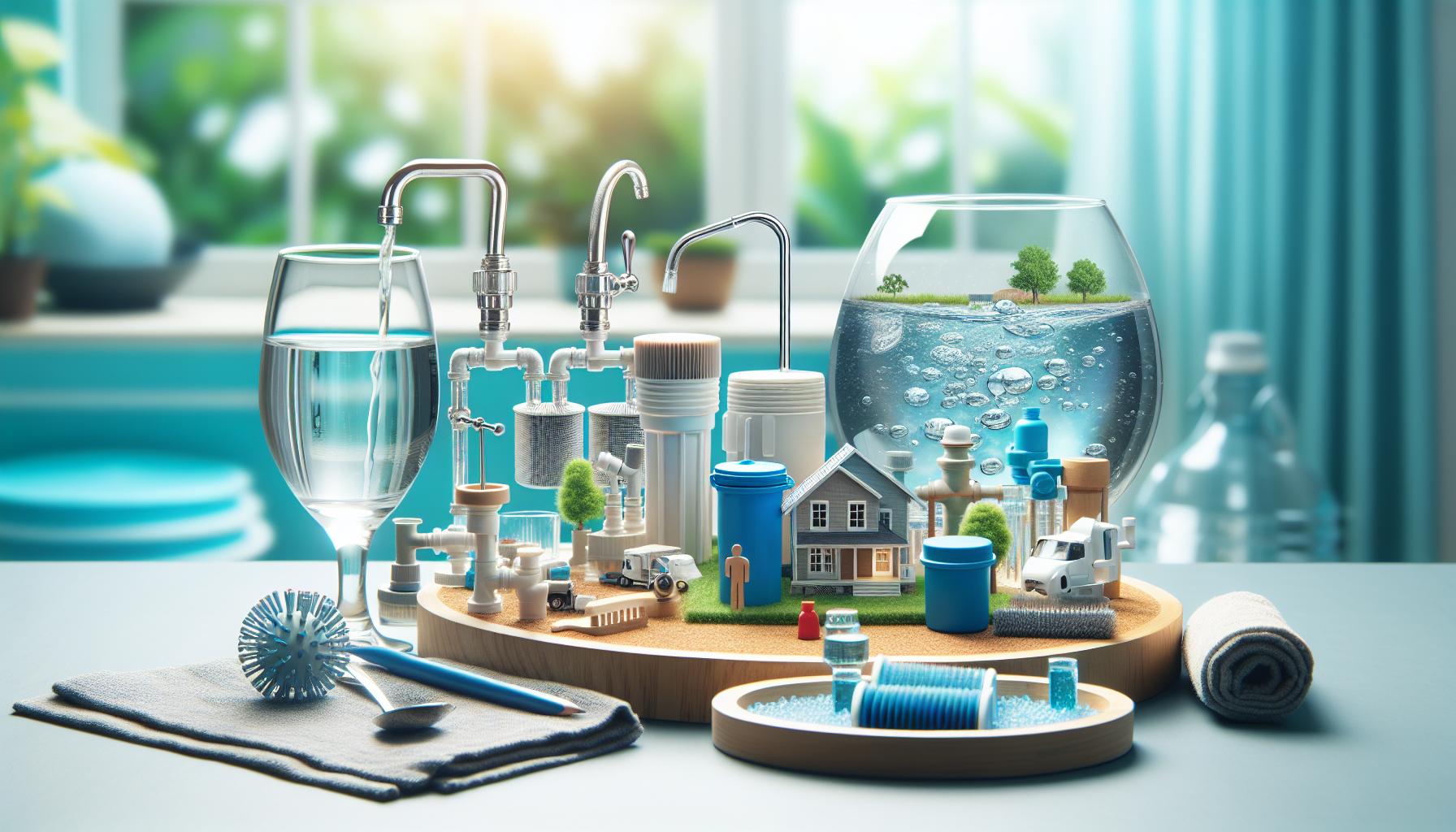
How a New Water Heater Can Enhance Energy Efficiency
Investing in a new water heater isn’t just about immediate comfort; it can significantly enhance your home’s energy efficiency, which is a key factor when considering the question of whether replacing a water heater increases home value. Modern water heaters come equipped with advanced technologies that can drastically reduce energy consumption while providing consistent hot water. For instance, heat pump water heaters utilize ambient air to heat water, making them about four times more efficient than standard electric units. Not only do they lower utility bills, but they also contribute to reducing your carbon footprint over time.
Efficiency Gains with Modern Technology
Today’s water heaters feature innovations that ensure hot water is always available without excessive energy use. Traditional tank systems often heat water continuously, which wastes energy. In contrast, newer models such as tankless or condensing water heaters offer on-demand heating, providing hot water only when needed. This reduction in standby heat loss translates to significant savings on energy costs, potentially more than $600 annually for an average household, as indicated by industry research.
- Tankless Water Heaters: These systems heat water directly without the use of a storage tank, leading to efficient energy use.
- Heat Pump Water Heaters: By pulling heat from the air, these units are highly efficient, drastically lowering energy consumption.
- Condensing Water Heaters: These utilize the flue gases that would otherwise be wasted to increase heat recovery and efficiency.
Long-Term Savings and Value Enhancement
Ultimately, the decision to replace your water heater can lead to substantial financial benefits. Many high-efficiency models qualify for energy rebates or incentives, making them even more economically appealing. As energy efficiency becomes a crucial selling point in real estate, having a modern, efficient water heater can increase your home’s market value. Buyers are often attracted to homes that promise lower energy costs and modern conveniences, reinforcing the relationship between a quality water heater and home valuation in the context of real estate insights.
| Water Heater Type | Energy Efficiency | Annual Cost Savings |
|---|---|---|
| Standard Electric | 100% | — |
| Heat Pump | 300%–400% | Up to $600 |
| Tankless | 100% (on-demand) | Varies |
| Condensing | Up to 95% | Up to $500 |
Considering these advantages, the choice to install a new water heater is not merely a home upgrade but a strategic move that can enhance energy efficiency and potentially increase your property value, aligning perfectly with the insights into real estate value discussed previously.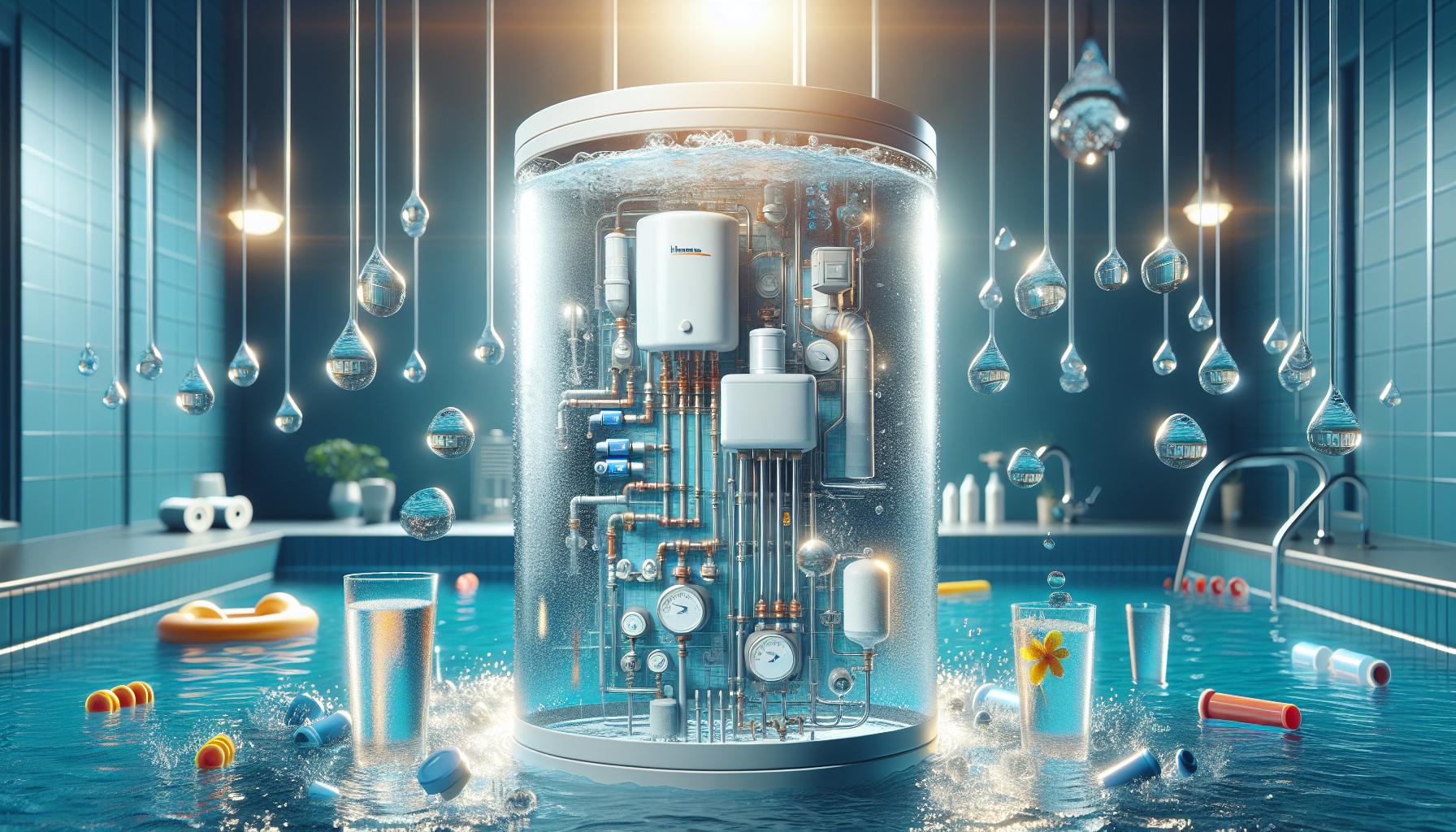
Factors That Influence Home Value in Real Estate
In the dynamic world of real estate, a variety of factors influence property values, often determining whether a home will attract premium offers or linger on the market. Among these, the condition and efficiency of essential home systems, such as water heaters, play a significant role in shaping buyers’ perceptions and decisions. Modern homeowners increasingly prioritize energy efficiency and reliability, with many considering these features critical during the purchasing process.
Key Factors Affecting Home Value
- Energy Efficiency: Homes equipped with high-efficiency appliances, including water heaters, tend to stand out in the market. Prospective buyers are often willing to pay a premium for homes that promise lower utility bills and reduced environmental impact. For example, replacing an outdated water heater with a tankless or high-efficiency unit not only updates the home’s infrastructure but can also make it more appealing to eco-conscious buyers.
- Home Maintenance and Upgrades: Regular updates and maintenance significantly affect a property’s value. Neglected systems can deter potential buyers or reduce offers, while recent replacements enhance appeal. A new water heater can reassure buyers of the home’s overall maintenance and longevity, impacting their confidence in the investment.
- Market Trends: The economic landscape plays a vital role in determining property values. Factors such as interest rates, local market conditions, and buyer demand can fluctuate, influencing how home upgrades like a new water heater are perceived. In hot markets, where buyers face competition, essential updates are likely to yield better returns.
Combining Factors for Maximum Impact
Successfully increasing a home’s value often involves a strategic combination of upgrades and understanding market conditions. When considering improvements, it’s vital to:
- Research local buyer preferences for energy-efficient systems.
- Evaluate the return on investment for specific upgrades based on current market data.
- Consult with local real estate experts to tailor improvements that align with market trends.
A practical approach would involve not only replacing an old water heater but also enhancing the entire home’s efficiency through related upgrades, such as insulation or smart home technology, creating a comprehensive package attractive to potential buyers.
Ultimately, keeping an eye on both the property’s condition and the broader economic factors can lead to more informed decisions and successful investments in the ever-evolving real estate market.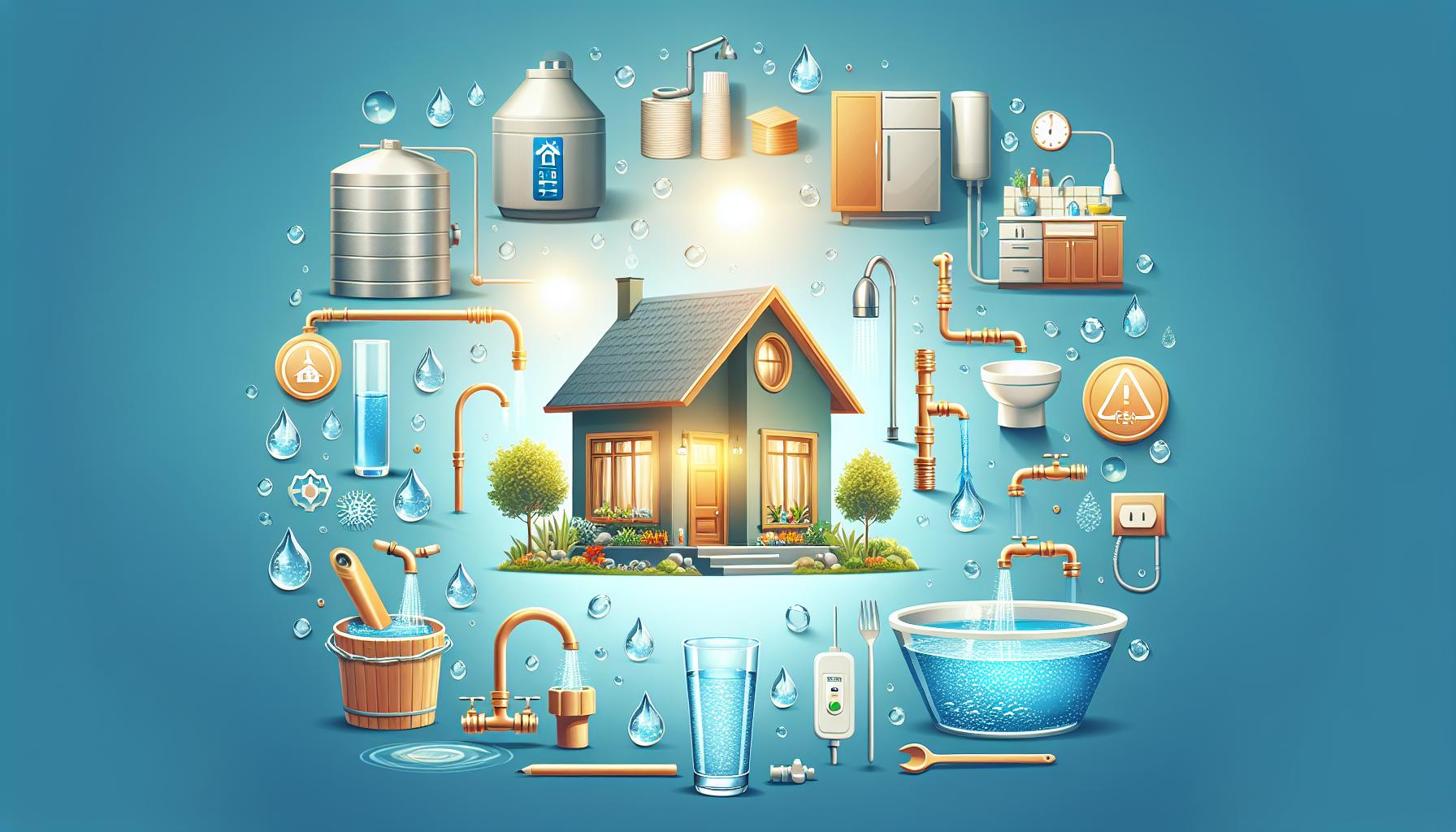
The Financial Benefits of Upgrading Your Water Heater
Upgrading your water heater is not just a home improvement task; it can also be a strategic financial investment. Many homeowners underestimate the financial benefits associated with modernizing this crucial appliance. A new water heater can enhance energy efficiency significantly, which translates into lower utility bills. In fact, opting for a tankless water heater can save households up to 30% on energy costs compared to traditional tank models, mainly due to its ability to heat water on demand rather than maintaining a reservoir of hot water constantly.
Energy Efficiency and Cost Savings
When considering whether replacing your water heater increases home value, it’s essential to focus on the immediate financial advantages as well. Modern water heaters are designed with advanced technology that enhances their efficiency. Here are a few notable benefits:
- Lower Energy Bills: Newer models often come with Energy Star ratings, indicating superior efficiency. Homeowners can expect a decrease in monthly energy bills.
- Increased Reliability: A new water heater reduces the likelihood of unexpected breakdowns, which can incur costly emergency repairs.
- Enhanced Performance: Modern designs provide a continuous supply of hot water, making them particularly appealing for larger families or households with high hot water demand.
Impact on Property Value
Investing in a new water heater not only provides immediate savings but can also boost the overall value of your home. Potential buyers often view energy-efficient appliances favorably, thus contributing to higher resale value. For instance, homes equipped with tankless water heaters are increasingly sought after in real estate markets due to their space-saving design and energy savings. As a result, according to various reports, homes with newer water heaters can see an uptick in value ranging from 3% to 5%, depending on the local real estate climate.
Long-Term Investment
In the long run, the upfront costs of a new water heater can be offset by the cumulative savings on utility bills and increased market value. Considering that traditional water heaters last about 10 to 15 years, upgrading to a modern unit can enhance both comfort and value. Homeowners who prioritize energy efficiency and sustainability are likely to attract buyers who are willing to pay a premium for features that reduce monthly expenses and environmental impact.
In summary, replacing your water heater is a financially astute move that provides numerous benefits, from immediate reductions in energy costs to enhancing your property’s marketability. As you ponder the question, “Does replacing a water heater increase home value?” it becomes clear that the answer is an enthusiastic yes, especially in the context of energy-efficient upgrades that resonate with today’s environmentally conscious homebuyers.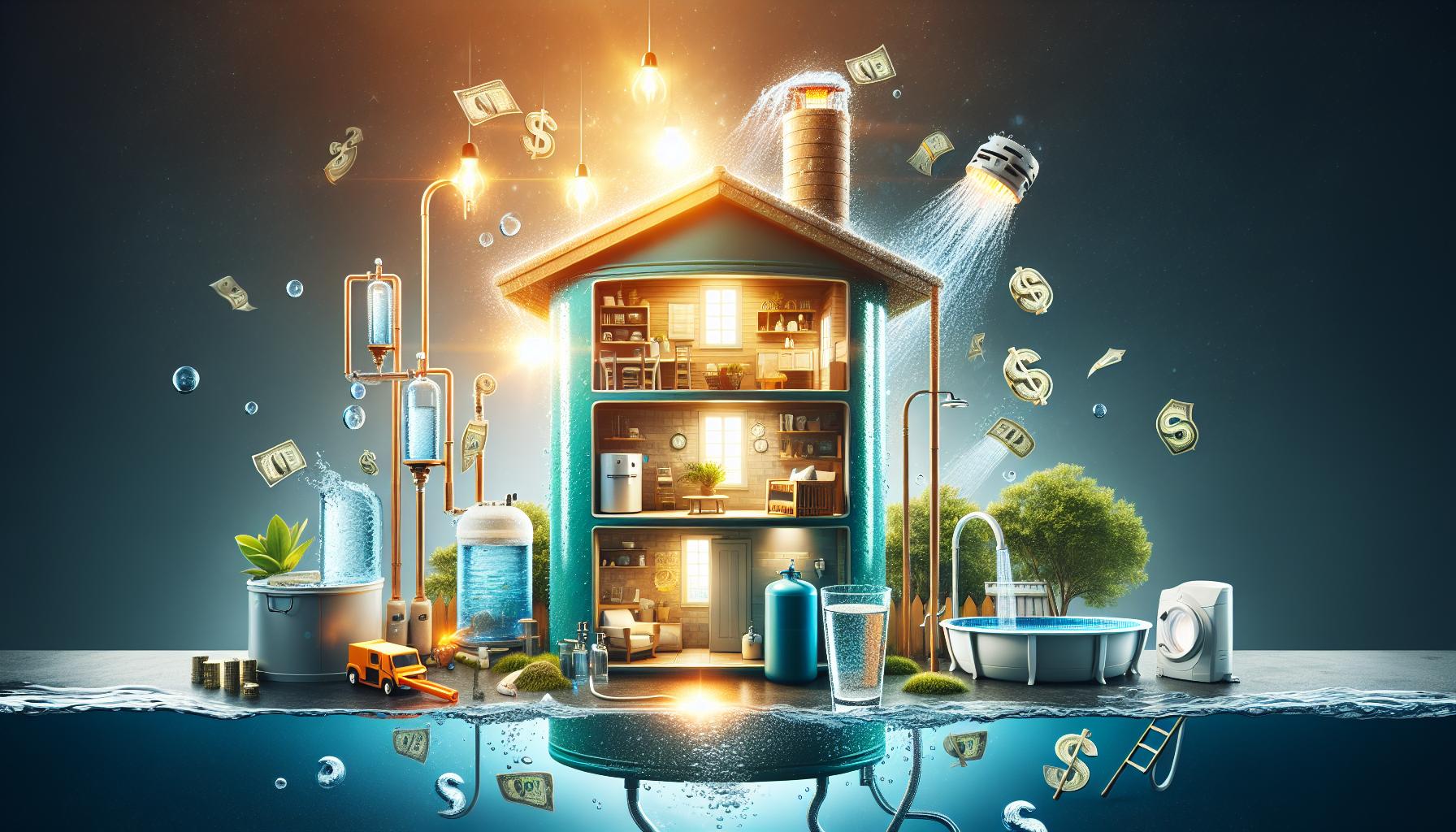
Key Selling Points for Homebuyers Related to Water Heating
A modern water heating system can be a game-changer in the home buying process. The shift towards energy efficiency and upgraded appliances has made homebuyers more conscious of the amenities that come with a property. An efficient water heater not only enhances a homeowner’s comfort but can also significantly improve a property’s marketability and value.
Key Benefits of Upgraded Water Heaters
Investing in a new water heater is not merely a home improvement; it’s an effective strategy for increasing appeal in a competitive market. Here are several key factors that homebuyers often consider regarding water heating systems:
- Energy Efficiency: New models, particularly tankless and heat pump water heaters, are designed to minimize energy consumption while maximizing hot water availability. This not only translates into lower utility bills for the homeowner but also reduces the home’s carbon footprint, making it attractive to environmentally conscious buyers.
- Reliability: An updated water heater means fewer breakdowns and constant hot water availability, which appeals greatly to families and individuals alike. Homebuyers appreciate the peace of mind that comes with reliable appliances.
- Modern Technology: Many contemporary water heaters are equipped with smart technology that allows homeowners to monitor and control water heating remotely. This added convenience can make a home feel more modern and technologically advanced.
- Higher Resale Value: Upgrading to a new water heating system can enhance the overall value of the home. A property with a brand-new, energy-efficient water heater can command higher offers and sell faster in today’s competitive real estate market [[2]](https://www.logan-inc.com/blog/does-replacing-a-water-heater-increase-home-value/).
Understanding Water Heater Options
Not all water heaters are created equal. When exploring options, buyers may find benefits in various types:
| Type | Benefits | Considerations |
|---|---|---|
| Tankless | On-demand heating, energy savings, space-saving design | Higher upfront cost, may require additional upgrades |
| Traditional Tank | Lower initial cost, widely available | Bulkier, less energy-efficient compared to modern options |
| Heat Pump | Highly efficient, suitable for energy-saving renovations | Requires specific environmental conditions, higher upfront cost |
By choosing the right system that aligns with both comfort and sustainability, homebuyers can significantly enhance both their living experience and the property’s overall value. As the question of whether replacing a water heater increases home value continues to resonate in real estate discussions, this strategic investment remains a crucial consideration for prospective homeowners [[3]](https://excelmechanical.com/does-replacing-a-water-heater-increase-home-value/).
Are There Upsides Beyond Financial Gains?
When considering the benefits of replacing a water heater, many homeowners focus solely on the potential increase in property value or cost savings from energy efficiency. However, the advantages extend far beyond mere financial incentives, enhancing the overall quality of life in your home. A modern water heater can significantly improve household comfort, convenience, and even safety.
A prime example is the shift to tankless water heaters, which offer an endless supply of hot water on demand. This feature not only alleviates the frustration of waiting for hot water during peak usage times but also allows households to run appliances simultaneously without worrying about running out of hot water. Additionally, newer models often come equipped with better insulation and advanced technology, leading to reduced energy consumption and a smaller carbon footprint. The improved energy efficiency not only aligns with environmental considerations but can also make your home more appealing to eco-conscious buyers in the future.
Moreover, investing in a new water heater—especially if it’s a high-efficiency model—can enhance the safety and reliability of your home’s plumbing system. For instance, old or poorly maintained units may pose risks of leaks or malfunctions, leading to extensive water damage and costly repairs. By upgrading to a modern system, you can not only safeguard your property but also provide peace of mind, knowing that your home’s infrastructure is reliable and secure.
In summary, while financial gains are significant when considering whether replacing a water heater can improve home value, the upsides also encompass enhanced comfort, safety, and sustainability. Homeowners who prioritize these aspects alongside potential monetary benefits often find greater satisfaction and long-term value in their investment. Emphasizing these additional factors can make the property more attractive to future buyers, making the replacement of an old water heater a wise decision not just for today, but for years to come.
When to Consider Water Heater Replacement for Maximum Value
An aging water heater can silently impact your home’s value and efficiency. Homebuyers increasingly seek properties with up-to-date appliances, and a new water heater can serve as a significant selling point. Identifying the perfect time for replacement is crucial, not just for immediate comfort but also for maximizing your investment value.
Signs That Indicate Replacement
Several indicators can suggest it’s time for a water heater replacement:
- Age of the Unit: If your water heater is over 10-15 years old, it might be nearing the end of its operational lifespan. Replacing it preemptively can prevent the inconvenience of a sudden breakdown.
- Frequent Repairs: An increase in repair frequency can signal that replacement is more cost-effective over time. Key components like the heating element or thermostat may be failing.
- Rust or Corrosion: Signs of rust on the tank or in the water can indicate serious issues. This can lead to leaks and may signal the need for immediate replacement.
- Fluctuating Water Temperature: Inconsistent hot water availability may mean the heating mechanism is malfunctioning.
- Higher Energy Bills: An inefficient unit can hike your energy costs. Upgrading to an energy-efficient model may provide savings that offset the replacement cost.
Types of Water Heaters to Consider
When considering which type of water heater to install, evaluate options based on your household’s needs:
| Water Heater Type | Average Cost | Considerations |
|---|---|---|
| Tank-style | $900 – $2,500 | Standard option; often lower upfront cost. |
| Tankless | $1,000 – $3,500 | Energy-efficient; provides hot water on-demand. |
| Gas | $500 – $2,500 | Generally lower operational costs if gas is available. |
Investing in a new water heater not only boosts home comfort but also enhances the property’s market appeal. Real estate insights suggest that energy-efficient upgrades can yield higher returns, with buyers often willing to pay a premium for homes equipped with modern systems. By proactively replacing an outdated unit, you’ll not only enjoy lower utility bills but also position your home favorably in the competitive real estate market.
Professional Insights: Real Estate Agents Weigh In on Water Heaters
When considering the impact of home improvements on property value, one standout feature that real estate agents frequently mention is the water heater. Modern buyers are increasingly savvy and place a premium on homes with updated, energy-efficient appliances. In many markets, especially those where energy costs are a significant concern, real estate professionals assert that a new or upgraded water heater can be a pivotal selling point.
Real Estate Agent Perspectives
Experienced agents often note that a water heater replacement or upgrade, particularly to a tankless model, can yield a measurable return on investment. For instance, homes featuring tankless water heaters have been shown to sell for about 4% more than those with traditional systems. Additionally, these upgrades can significantly reduce the time a home spends on the market—by an average of 43 days—making them not only a value-add but also a strategy for quicker sales [[2]].
- Energy Efficiency: Buyers are increasingly concerned with utility bills—homes with modern, energy-efficient systems are viewed as more appealing. This demand highlights the relevance of investing in advanced water heaters that promise reduced energy consumption.
- Market Competitiveness: Upgrading your water heater can enhance your property’s marketability. Agents recommend that sellers not only replace outdated units but also display energy savings in marketing materials to attract eco-conscious buyers.
- Comfort and Convenience: Updated hot water systems often provide more reliable and quicker access to hot water, which buyers value as an essential comfort [[3]].
Thus, the consensus among real estate agents reflects a growing recognition that investing in new water heaters is a smart enhancement for homeowners looking to increase both their home’s value and its appeal to prospective buyers. With rising energy prices and the increasing importance of sustainability, a modern water heater can not only highlight a home’s value but serve as a strategic asset in today’s competitive real estate landscape. As agents continuously emphasize, making such thoughtful upgrades can lead to both higher offers and a swifter sale process.
Q&A
Does Replacing Water Heater Increase Home Value?
Yes, replacing a water heater can increase home value. A new, efficient model attracts potential buyers and can enhance the overall appeal of your home.
Homebuyers look for properties that require less immediate maintenance. A modern water heater signifies reliability and energy efficiency, which are appealing traits. Properties with updated appliances generally show better value in the market.
What is the impact of upgrading to a tankless water heater?
Upgrading to a tankless water heater can significantly increase your home’s value. These units take up less space and provide on-demand hot water, making them attractive to buyers.
Tankless options often boast better energy efficiency, leading to lower utility bills, which can be a pivotal factor for environmentally conscious buyers. Such benefits make your home more competitive in the real estate market.
Can I expect a return on investment from replacing my water heater?
Yes, replacing your water heater can yield a good return on investment (ROI). Home value may rise, especially if the new unit is energy-efficient.
While the ROI varies by region and market conditions, a modern water heater can lead to lower operational costs, making your home more appealing long-term. Evaluate local real estate trends for more tailored insights.
Why does energy efficiency matter when replacing a water heater?
Energy efficiency is crucial when replacing a water heater because it lowers operating costs and increases your home’s attractiveness to eco-aware buyers.
An energy-efficient water heater not only saves money on utility bills but also reduces your carbon footprint, aligning with many buyers’ values today. This can lead to quicker sales and potentially higher offers.
What type of water heater should I install to increase my home value?
Installing a high-efficiency water heater, whether gas or electric, can enhance your home’s value the most. Consider tankless or condensing models for optimal efficiency.
These types save space and reduce energy consumption, making them appealing to prospective buyers. Additionally, ensuring proper installation and maintenance can maximize the unit’s lifespan and performance.
How often should I replace my water heater for best home value?
It’s advisable to replace your water heater every 8 to 12 years. This time frame helps maintain efficiency and minimizes risks of breakdowns.
By replacing it regularly, you ensure that your home retains its value and remains compliant with modern efficiency standards, making it more marketable.
Can a broken water heater affect home value?
A broken water heater can negatively impact home value, as it may indicate neglected maintenance and lead to buyer hesitation.
Buyers often factor in repair costs when determining their offers. A functioning, efficient water heater conveys care for the property, enhancing its appeal in a competitive market.
Key Takeaways
In conclusion, replacing your water heater not only enhances your home’s energy efficiency but can also significantly increase its market value. Upgrading to modern models, especially tankless or energy-efficient options, can attract potential buyers and expedite the selling process. As you consider this investment, remember that a new water heater can improve your daily comfort and save you money in the long run. For those looking to enhance their property’s appeal or simply improve their home experience, exploring options for water heater replacements is a smart choice. Dive deeper into this topic and discover how you can elevate your home’s value and efficiency today!



